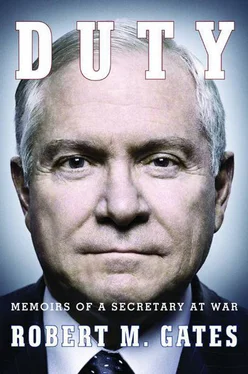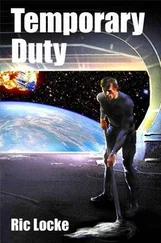Literally minutes later Bolten called to tell me the president had decided to move forward. A one p.m. press announcement was planned for Wednesday, November 8, followed by a televised three-thirty presidential appearance with Secretary Rumsfeld and me in the Oval Office.
Cheney, as he wrote in his memoir, had opposed the president’s decision to replace Rumsfeld, who was an old friend, colleague, and mentor. I suspected as much at the time and was relieved when Bolten passed along to me that Secretary of State Rice had been enthusiastic about my nomination and that the vice president had said I was “a good man.” As Bolten said, coming from Cheney, that was high praise.
I kept Becky informed of all this—I didn’t dare do otherwise—and expressed only one misgiving to her as that Sunday ended. The Bush administration by then was held in pretty low esteem across the nation. I told her, “I have to do this, but I just hope I can get out of this administration with my reputation intact.”
On Monday, the ponderous wheels of a major confirmation process began to move, still in secret. My first contact was with the White House counsel, Harriet Miers, to begin going through all the ethics questions associated with my membership on corporate boards of directors, my investments, and all the rest. The political side of confirmation began on Tuesday, when I was asked to provide lists of members of Congress I thought would be positive in their reactions, as well as former officials, journalists, and others who could be expected to comment favorably on my selection. I was asked to be at the White House at midmorning on the eighth.
I was flown to Washington in an unmarked Air Force Gulfstream jet that landed at Andrews Air Force Base, just outside Washington, where it taxied to a remote part of the airfield. I was picked up (again) by Joe Hagin.
A few minutes later I arrived at the White House and was shown to a small office in the West Wing basement, where I would begin making courtesy phone calls to congressional leaders, key members of Congress, and other notables in and out of Washington. I was introduced to David Broome, a young White House legislative assistant who would be my “handler” and shepherd me through the confirmation process. I had some experience on the Hill myself, of course, but David was a very smart, practical, and astute observer of Capitol Hill, as well as a U.S. Marine Corps reserve officer. I felt very comfortable with him.
I made a number of calls, and the reactions to my impending nomination were overwhelmingly positive. I learned that even the Republicans were very nervous about Iraq and eager for a change from the current approach—especially given that many of them attributed their party’s loss of control of Congress in the election the day before mostly to the public’s growing opposition to the war. Not knowing where I would come down on Iraq, they still welcomed me. The Democrats were even more enthusiastic, believing my appointment would somehow hasten the end of the war. If I had any doubt before the calls that nearly everyone in Washington believed I would have a one-item agenda as secretary, it was dispelled in those calls.
At about twelve-thirty p.m. Texas time, about a half hour into the president’s press conference announcing the change at Defense, an e-mail I had prepared was sent to some 65,000 students, faculty, and staff at Texas A&M with a personal message. The hardest part for me to write went as follows: “I must tell you that while I chose Texas A&M over returning to government almost two years ago, much has happened both here and around the world since then. I love Texas A&M deeply, but I love our country more and, like the many Aggies in uniform, I am obligated to do my duty. And so I must go. I hope you have some idea of how painful that is for me and how much I will miss you and this unique American institution.”
A couple of hours later, it was showtime. The president, Rumsfeld, and I met briefly in the president’s private dining room before Rumsfeld led the way into the Oval Office, followed by the president, then me. It had been nearly fourteen years since I had been in the Oval Office.
The president opened his remarks with a statement about the need to stay on the offensive in both Iraq and Afghanistan to protect the American people. He spoke of the role of the secretary of defense and then reviewed my career. He then made two comments that would frame my challenges as secretary: “He’ll provide the department with a fresh perspective and new ideas on how America can achieve our goals in Iraq” and “Bob understands how to lead large, complex institutions and transform them to meet new challenges.” He went on to generously praise Rumsfeld’s service and his achievements as secretary and to thank him for all he had done to make America safer. Rumsfeld stepped to the podium next and spoke about the security challenges facing the country but focused especially on thanking the president for his confidence and support, his colleagues in the Department of Defense, and above all our men and women in uniform for their service and sacrifice. I thought the statement showed a lot of class.
Then it was my turn. After thanking the president for his confidence and Don for his service, I said:
I entered public service forty years ago last August. President Bush will be the seventh President I have served. I had not anticipated returning to government service and have never enjoyed any position more than being president of Texas A&M University.
However, the United States is at war, in Iraq and Afghanistan. We’re fighting against terrorism worldwide. And we face other challenges to peace and our security. I believe the outcome of these conflicts will shape our world for decades to come. Because our long-term strategic interests and our national and homeland security are at risk, because so many of America’s sons and daughters in our armed forces are in harm’s way, I did not hesitate when the president asked me to return to duty.
If confirmed by the Senate, I will serve with all my heart, and with gratitude to the president for giving me the opportunity to do so.
Press coverage and public statements in the ensuing days were very positive, but I had been around long enough to know that this was less a show of enthusiasm for me than a desire for change. There was a lot of hilarious commentary about a return to “41’s” team, the president’s father coming to the rescue, former secretary of state Jim Baker pulling all the strings behind the scenes, and how I was going to purge the Pentagon of Rumsfeld’s appointees—“clean out the E-Ring” (the outer corridor of the Pentagon where most senior Defense civilians have their offices). It was all complete nonsense.
For the next three weeks, while I continued to go through the motions of a university president, I was caught up in preparations for confirmation. Even though I was a former CIA director who had had access to the “crown jewels” of American secrets, I had to fill out the infamously detailed Federal Form SF 86—“Questionnaire for National Security Positions”—just like anyone else applying for a job in government. Like any senior appointee, I had to fill out the financial disclosure statements, among others. I’d done all these before, but the climate in Washington had changed, and inaccurate answers—even innocent mistakes—had tripped up other nominees in recent years. So I was advised to engage a Washington law firm that specialized in completing these forms to ensure there would be no errors. Because I wanted no hiccups to delay my confirmation, I took the advice and, $40,000 later, turned in my paperwork. (I could only imagine the cost for nominees who had far more complex—and bigger—financial disclosures.) I also had sixty-five pages of questions from the Senate Armed Services Committee to answer. The good news on the latter was that the Pentagon has a large group of people who do the bulk of the work in preparing answers to these questions, although the nominee must review and sign them and be prepared to talk about those answers in a confirmation hearing.
Читать дальше












